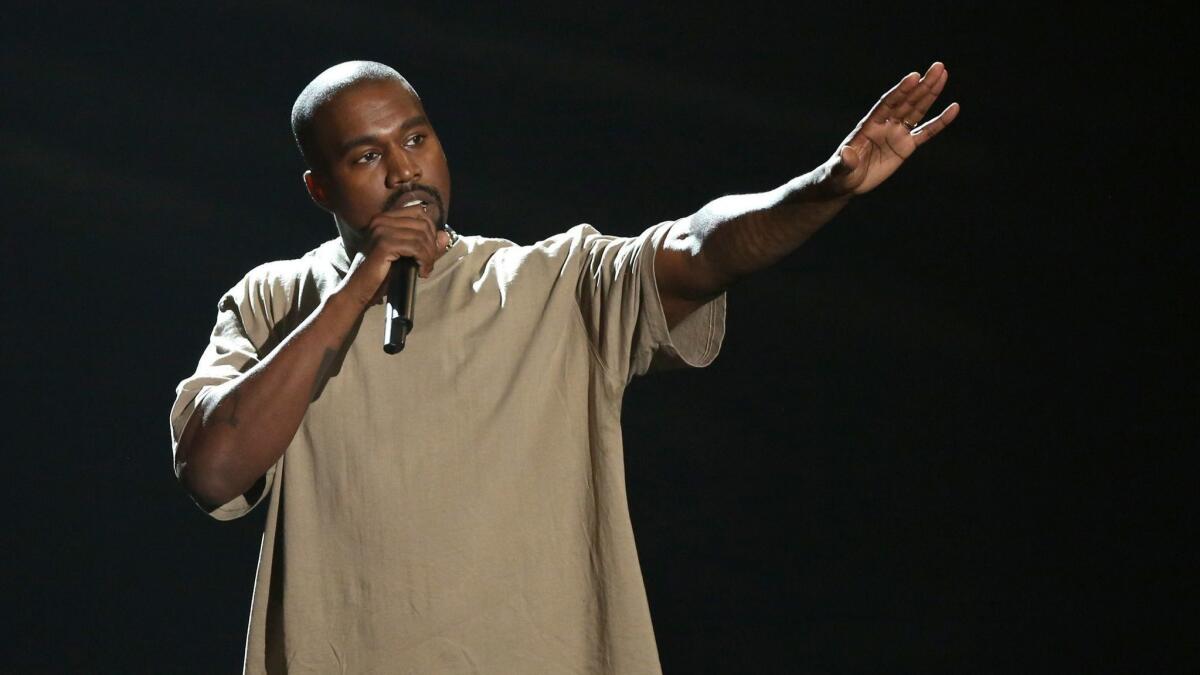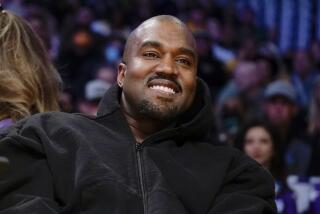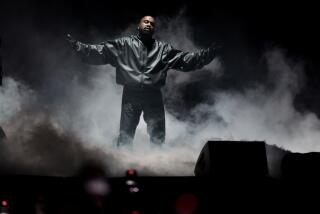Review: Kanye West’s ‘Ye’ unintentionally illustrates the limits of alpha-male bravado

- Share via
“The most beautiful thoughts are always besides the darkest,” Kanye West announces to begin his exasperating new album, “Ye.” So here, side by side, are two seemingly contradictory conclusions I’ve reached after listening to this thing pretty much nonstop since it came out Friday morning:
1. Kanye West is a musical visionary whose ability to conceive and combine unlikely sounds has few equals.
2. Kanye West is a deeply troubling person whose views on women and morality feel about as unhelpful as possible.
Let’s start with those problematic ideas, as the rapper more or less forced us to by spending the few weeks leading up to “Ye’s” release in full internet-troll mode.
By this point, you’re familiar with the highlights (if that’s the word): his declaration that slavery was “a choice,” his proud modeling of a Make America Great Again cap, his tweet about the “dragon energy” he shares with President Trump.
As West lobbed these bombs, it was hard to know which was more upsetting to his longtime fans: the suspicion that he was cynically using these pronouncements to drum up interest in his album — or the fear that he sincerely meant everything he said.
“Ye” points toward the latter.
Though it sidesteps the explicit political conversation he appeared to be setting up, this seven-track project — the second, following Pusha-T’s “Daytona,” in a planned series of EP-length records overseen by West — reveals a dispiriting shift in the rapper’s thinking, away from the radical sensitivity that once defined his work (even as he drew from an endless well of bluster) and toward a kind of nihilistic self-obsession that feels all too familiar right now.
With three forbidding cuts followed by four more exuberant ones, “Ye” is clearly structured to mirror the bipolar disorder West says he was recently diagnosed with — and which he calls his “superpower” in “Yikes.” (The album’s cover features a landscape photo of Wyoming, where he reportedly made the record, overlaid with the words “I hate being Bi-Polar its awesome.”)
But while the depressive stuff is unsurprisingly disturbing — “I Thought About Killing You,” which opens “Ye,” evokes a school shooter’s nightmarish manifesto — West’s moments of euphoria prove no less vexing.
In “Wouldn’t Leave,” a twinkling, gospel-soul number, he refers to his comments on slavery, but not to apologize for them or attempt to explain such an absurd position; instead, he holds them up, Trump-style, as indication of a liberated mind uncowed by thought police. “Just imagine if they caught me on a wild day,” he raps.
What’s worse, “Wouldn’t Leave” presents West’s audacity as an aspect of the behavior that his wife, Kim Kardashian West, is willing to tolerate, thanks to her “loyalty,” as he puts it.
I’m not here to judge anyone’s marriage. But that framing is just one of many instances on “Ye” when West seems incapable of envisioning women as anything more than accomplices to an action plan of toxic masculinity.
In “Yikes,” he prays for Russell Simmons, the hip-hop mogul accused of sexual misconduct, “’cause he got #MeToo’d” — then considers how uncomfortable it would be “if that happened to me too.” In “All Mine,” he enumerates desirable women as though they were items on a shopping list: “I could have Naomi Campbell / And still might want me a Stormy Daniels.” (West never mentions Trump by name, but perhaps that’s because he didn’t need to.)
Those two songs come early on “Ye”; we might reasonably assume, therefore, that West is knowingly voicing his darkest impulses.
Yet the queasy men’s-rights vibe actually peaks with the album’s closer, “Violent Crimes,” in which he echoes countless dimwitted politicians before him to say that, in a predatory world, having daughters has shown him that women are “something to nurture, not something to conquer.”
That’s quite a bit of emotional work he’s asking 4-year-old North and 4-month-old Chicago to perform on his behalf.
As dangerous as that notion is on paper, though — 40-year-old men need to be responsible for their own maturity — this hymn-like ballad built on churchy keyboards is so exquisitely rendered that, like much of “Ye,” it threatens to bring you over to his point of view.
Many critics have complained about the lack of an evolutionary leap in West’s production here; they’ve said “Ye” merely rehashes signature tricks instead of introducing a bold new sound as he did with “Yeezus” or “808s & Heartbreak.”
But to my ears, “Ye” represents a brilliant synthesis that’s no less impressive for relying on proven elements. The chords are gorgeous and complicated; the textures juxtapose softness and hardness in another deft expression of bipolarity.
And the singing, by West and others, is just astounding, particularly in “No Mistakes,” with the irrepressible Charlie Wilson, and “Ghost Town,” which features the young New Jersey artist 070 Shake in a star-making cameo.
“I put my hand on a stove to see if I still bleed,” she sings — howls, really — over layers of sludgy psych-rock guitar, “And nothing hurts anymore / I feel kind of free.”
On an album that unintentionally illustrates the limits of alpha-male bravado, that “kind of” strikes like a bolt of clarity.
___________
Kanye West
“Ye”
(G.O.O.D. Music/Def Jam)
Twitter: @mikaelwood
More to Read
The biggest entertainment stories
Get our big stories about Hollywood, film, television, music, arts, culture and more right in your inbox as soon as they publish.
You may occasionally receive promotional content from the Los Angeles Times.











